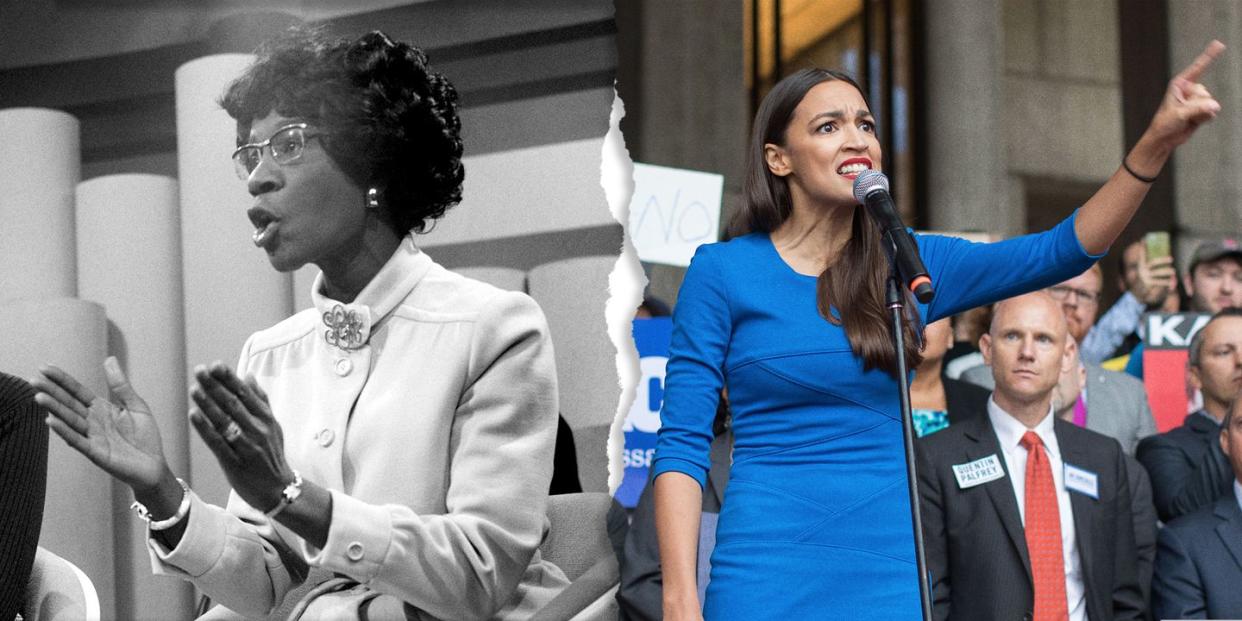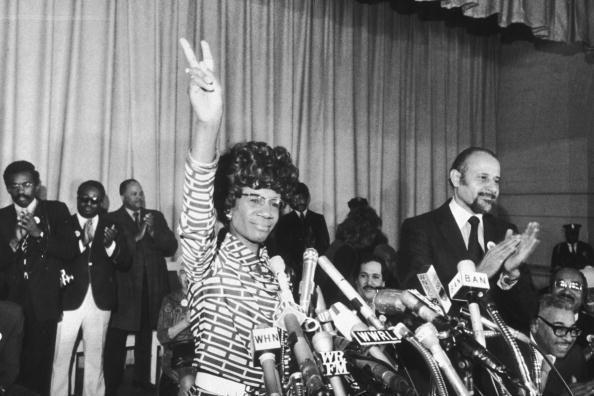Alexandria Ocasio-Cortez Doesn't Have Time to 'Learn the Job.' Neither Did Shirley Chisholm.

Alexandria Ocasio-Cortez has received her congressional committee assignment, and for everyone who thought her outspoken nature-which has led to her criticizing even those within her own party-would lead to some sort of punishment, it’s quite a surprise. She will serve on the House Financial Services Committee, which oversees banks and the financial sector and is chaired by Rep. Maxine Waters. It’s a perfect perch for someone of Ocasio-Cortez’s ideological bent, as it presents an opportunity to challenge the financial system which has been the engine of growing wealth inequality, locally and globally.
She fared much better with her assignment than did Shirley Chisholm, the first black woman ever elected to Congress, in 1969. Seniority weighs heavily in the assignment process, and freshmen obviously have little to no leverage. Upon her arrival, Chisholm wasn’t thrilled to be assigned to the Agriculture Committee, which sounded like it had little to do with the needs of her constituents in New York’s 12th Congressional District, which then comprised of parts of Brooklyn (today it includes parts of Manhattan and Queens as well). But once she learned that the Agricultural Committee had jurisdiction over food stamp and surplus food programs, in addition to being concerned with migrant labor, the assignment didn’t feel so arbitrary.

However, her subcommittee assignment, to rural development and forestry, was completely out of step with anything Chisholm would have imagined. Sure, a tree grows in Brooklyn, but there are not forests. And her background was in education, having worked for years as a school teacher and administrator. There was little she had to contribute, or that the constituents in her district could gain, from her subcommittee assignment in forestry. So she told the Speaker of the House as much.
Writing in her 1970 memoir, Unbought & Unbossed, the title of which had been her congressional campaign slogan, Chisholm recalled Speaker John McCormack responding to her concerns, “Mrs. Chisholm, this is the way it is. You have to be a good soldier.” Chisholm was not content to be a “good soldier,” as she told him in response: “All my forty-three years I have been a good soldier. The time is growing late, and I can’t be a good soldier any longer…If you do not assist me, I will have to do my own thing.”
In the past decade or so, Chisholm’s name has been invoked more and more in our national politics. She made history as the first black woman elected to Congress, and then the first black woman to run for a major party’s presidential nomination, so it made sense she would come up in the historic 2008 elections, when Barack Obama and Hillary Clinton emerged as serious contenders for the Democratic party’s nomination. But lately it’s a new crop of congresswomen-bold, progressive, outspoken, defiant-that have drawn comparisons to Chisholm that are more aligned with the congresswoman’s particular legacy.
I thought of Chisholm’s bold retort to the Speaker-"I will have to do my own thing"-when Ocasio-Cortez joined the more than 200 activists who staged a demonstration in Nancy Pelosi’s office back in November in order to urge the Democrats toward more swift and decisive action on climate change. Ocasio-Cortez was still about two months from being sworn in, her election having been the most exciting event of our national politics in 2018. She defeated the 10-year incumbent Joe Crowley to take over the seat in New York’s 14th Congressional District, after receiving little national press coverage and while running as an active member of Democratic Socialists of America.

After the November protest, Ocasio-Cortez said to reporters: "We need a Green New Deal and we need to get to 100 percent renewables because our lives depend on it….The [Intergovernmental Panel on Climate Change] themselves, they say we have 10 years left and I...am thinking not just about what we are going to accomplish in the next two years but the America that we’re going to live in in the next 30 years."
Ocasio-Cortez, like Chisholm before her, is driven by an urgency not typically found in American politicians. After successfully arguing her way off the Agriculture Committee and being reassigned to the Veterans’ Affairs Committee, Chisholm was told by a number of her colleagues that she had committed political suicide. In her memoir, she recalled a wire service reporter writing: “Power and influence in Congress are not obtained by promoting one’s own measures. They come either from blocking measures others want enacted or supporting measures others oppose. As a member of the Agriculture Committee, Mrs. Chisholm would have been in an ideal position to make her presence felt. Without offending her own constituents, she could have voted against all of the bills introduced for the benefit of farmers. At the same time she could have introduced bills to scuttle price supports and other farm programs, Before long, farm belt congressmen would have been knocking on her door, asking favors.”
This, for any career politician, would seem a sensible, if shrewd, means of accruing power over time. But it would only have served to make Chisholm more powerful later, while the immediate needs of her constituents took a backseat. This is not the kind of politics she was interested in, and wrote, “What I can never forget, and what my friend the reporter apparently never knew, is that there are children in my district who will not live long enough for me to play it the way he proposes.”
Ocasio-Cortez faces a similar criticism, and thus far seems to be approaching with same brashness Chisholm once exhibited. During a Fox Business News interview, former Democratic vice presidential nominee Joe Lieberman said, “With all respect, I certainly hope she’s not the future and I don’t believe she is.” On the daytime talk show The View, Whoopi Goldberg offered her opinion: “You just got in there, and I know you got lots of good ideas, but I would encourage you to sit still for a minute and learn the job. There are people in that party who have been working their tails off for this country. You could learn some stuff from them." Rep. Emanuel Cleaver of Missouri told Politico: “I’m sure Ms. Cortez means well, but there’s almost an outstanding rule: Don’t attack your own people. We just don’t need sniping in our Democratic Caucus.”
Perhaps in a different time, some of this advice may have seemed prudent and sensible (though Lieberman was just hating). But as Ocasio-Cortez notes, there is not much time left. Failure to act on climate change now, as we have for decades, will result in the planet becoming uninhabitable. If there is no planet, there is no Congress for Ocasio-Cortez to influence. Up against a Republican party that refuses to even acknowledge that climate change is happening, the Democrats are, woefully, our only hope for ensuring the kind of policy change needed to adequately address the problem. Ocasio-Cortez recognizes this, but also sees that her Democratic colleagues are moving as if the fire is not right underneath them.
And maybe it rankles a bit to be reminded by an upstart that you have spent your career doing too little. It should. There is too little concern shown by our elected officials for the very real crises we are facing, especially when compared to the amount of time and resources they are able to devote to crises of their own imagination. But when your priority is your own career ambitions, you act accordingly.

Ocasio-Cortez, like Chisholm before her, does not have this luxury, and not only because of the impending climate disaster. As women of color, their very presence in the halls of Congress has been an anomaly. It is not just that there have been institutional barriers to them getting in, but that these institutions have been deliberate in using their power to ensure the subjugation of women like Chisholm and Ocasio-Cortez. To paraphrase Jay-Z: they ain’t even ‘sposed to be here. Chisholm had bucked the Kings County Democratic party machine’s efforts to thwart her in order to win the primary nomination, having to stop campaigning for several months due to a cancer diagnosis, only to have the Republican party run James Farmer, the civil rights activist and former national chairman of the Congress for Racial Equality (CORE), who didn’t even live in Brooklyn, but was a candidate with much more name recognition. And a man. She won anyway.
She wasn’t supposed to make it that far, and never saw for herself a long congressional career-six to eight years at the most, she wrote, “and then somehow my refusal to compromise will catch up to me.” She lasted a little longer than that, retiring in 1982 for a number of reasons personal and political, but what she was able to accomplish in her time-most notably the creation of a national school lunch program, as well as the expansion of the food stamps program through the establishment of Special Supplemental Nutrition Program for Women, Infants and Children (or WIC)-was a product of that uncompromising attitude.
As Ocasio-Cortez takes up the mantle of this brand of politics in our time, there is no telling what she can make happen. But it’s clear she would rather do good work than be a good soldier.
('You Might Also Like',)

